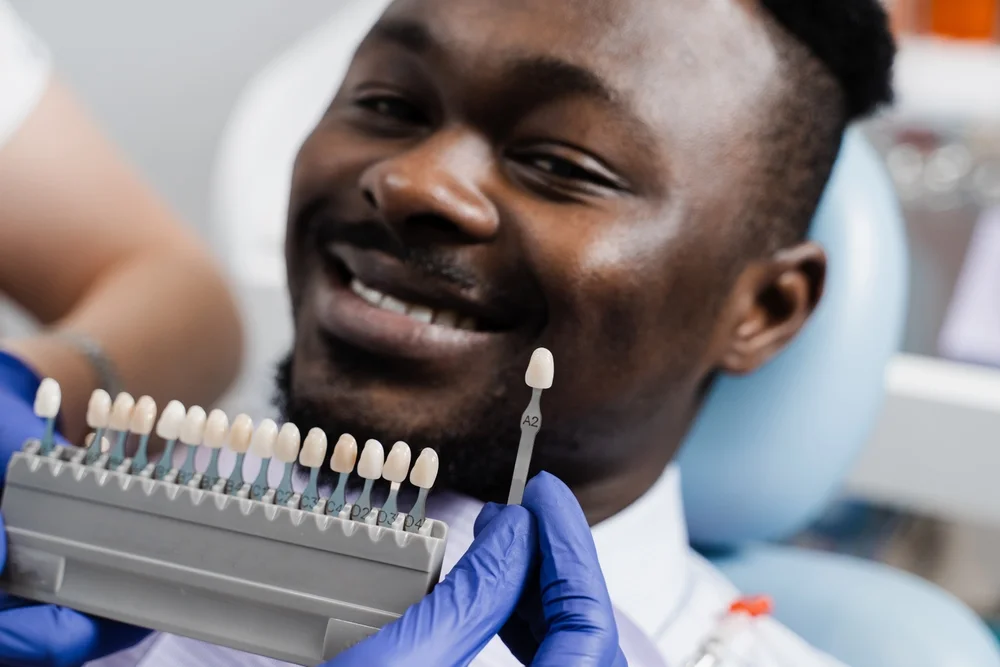The Complete Guide to Dental Veneers

Outline:
- Introduction
- What are Dental Veneers?
- Importance of Dental Veneers
- Types of Dental Veneers
- Porcelain Veneers
- Composite Veneers
- Benefits of Dental Veneers
- Aesthetic Enhancement
- Durability and Longevity
- Who Should Consider Dental Veneers?
- Ideal Candidates
- Situations Where Veneers Might Not Be Suitable
- The Dental Veneer Procedure
- Initial Consultation
- Preparation of Teeth
- Bonding Process
- Caring for Dental Veneers
- Daily Oral Hygiene
- Avoiding Damaging Habits
- Cost of Dental Veneers
- Factors Influencing Cost
- Insurance and Financing Options
- Potential Risks and Complications
- Common Issues
- How to Mitigate Risks
- Alternatives to Dental Veneers
- Teeth Whitening
- Dental Bonding
- Crowns
- Success Stories and Testimonials
- Real-life Experiences
- Before and After
- Choosing the Right Dentist
- Credentials to Look For
- Questions to Ask
- Technological Advancements in Veneers
- Digital Imaging
- Improved Materials
- Veneers for Specific Dental Issues
- Fixing Gaps and Spacing
- Correcting Misalignment
- Repairing Chipped or Broken Teeth
- Common Myths About Dental Veneers
- Veneers Look Fake
- Veneers are Only for the Wealthy
- Conclusion
- Recap of Benefits
- Encouragement to Consult a Dentist
- FAQs
- How long do dental veneers last?
- Do veneers require special care?
- Are veneers reversible?
- Can veneers get stained?
- Is the veneer procedure painful?
The Complete Guide to Dental Veneers
Introduction
Dental veneers have become a popular choice for individuals looking to enhance their smiles. But what exactly are tooth veneers, and why are they so important? Let’s dive in and explore everything you need to know about tooth veneers, from their types and benefits to the procedure and aftercare.
What are Dental Veneers?
Dental veneers are delicate, tailor-made coverings crafted to overlay the front surface of teeth, enhancing their aesthetic appeal. They are usually crafted from either porcelain or composite resin and are securely attached to your teeth.
Importance of tooth veneers
Veneers play a crucial role in cosmetic dentistry. They can transform a person’s smile by addressing various dental issues such as discoloration, gaps, and minor misalignments. This not only boosts self-esteem but also enhances overall dental health by protecting the surface of damaged teeth.
Types of Dental Veneers
Porcelain Veneers
Porcelain veneers are the most common type. They are highly durable and mimic the light-reflecting properties of natural teeth, providing a very natural look. Porcelain veneers are stain-resistant, making them a long-lasting solution for a beautiful smile.
Composite Veneers
Composite veneers are made from a tooth-colored resin and are usually applied in one visit. Although they cost less than porcelain veneers, they are also less long-lasting and may need more frequent upkeep.
Benefits of Tooth veneers
Aesthetic Enhancement
One of the primary benefits of tooth veneers is the aesthetic improvement they offer. Veneers can whiten teeth, close gaps, and correct minor misalignments, giving you a picture-perfect smile.
Durability and Longevity
tooth veneers are designed to last. Porcelain veneers, in particular, can last for 10-15 years or more with proper care. This makes them a worthwhile investment in your dental health and appearance.
Who Should Consider Dental Veneers?
Ideal Candidates
Dental veneers are ideal for individuals with discolored, worn, chipped, or misaligned teeth. They are also a great option for those who want to achieve a uniform, white smile quickly and effectively.
Situations Where Veneers Might Not Be Suitable
Veneers might not be the best choice for individuals with severe tooth issues such as extensive decay or gum disease. In such cases, other dental treatments might be more appropriate.
The Dental Veneer Procedure
Initial Consultation
The process of obtaining veneers begins with a preliminary consultation. During this visit, your dentist will discuss your goals, evaluate your teeth, and determine if veneers are the right solution for you.
Preparation of Teeth
Once you’ve decided to proceed, your dentist will prepare your teeth by removing a small amount of enamel from the front surface. This step is crucial for ensuring the veneers fit properly and look natural.
Bonding Process
After preparation, the veneers are bonded to your teeth using a special adhesive. The dentist will then use a curing light to harden the adhesive, securing the veneers in place.
Caring for Dental Veneers
Daily Oral Hygiene
Keeping up with proper oral hygiene is crucial for extending the lifespan of your veneers . To maintain healthy teeth and gums, make sure to brush and floss every day.
Avoiding Damaging Habits
Avoid habits that can damage your veneers, such as biting your nails, chewing on hard objects, or using your teeth as tools. Also, try to limit foods and drinks that can stain your veneers, like coffee and red wine.
Cost of Dental Veneers
Factors Influencing Cost
Typically, porcelain veneers range in price from $800 to $2,500 per tooth, whereas composite veneers cost between $150 and $350 per month,
Insurance and Financing Options
Since veneers are classified as a cosmetic treatment, they are generally not covered by most dental insurance plans. However, many dentists offer financing options to help manage the cost.
Potential Risks and Complications
Common Issues
As with any tooth treatment, veneers carry certain potential risks. These can include tooth sensitivity, discomfort, or issues with fit. It’s important to discuss these risks with your dentist beforehand.
How to Mitigate Risks
Choosing a qualified and experienced dentist can significantly reduce the risks associated with veneers. Additionally, following your dentist’s care instructions can help ensure the best outcome.

Alternatives to Dental Veneers
Teeth Whitening
If you’re primarily concerned with discoloration, teeth whitening might be a simpler and less invasive alternative to veneers.
Dental Bonding
Dental bonding is another option for fixing minor cosmetic issues. It involves applying a tooth-colored resin to repair chipped or discolored teeth.
Crowns
For more severe dental issues, crowns might be a better option. Crowns cover the entire tooth and provide greater strength and protection than veneers.
Success Stories and Testimonials
Real-life Experiences
Hearing from others who have undergone the veneer process can be incredibly reassuring. Many patients report a significant boost in confidence and satisfaction with their new smiles.
Before and After
Before-and-after photos can give you a clear idea of the transformative power of veneers. Seeing these results can help set realistic expectations for your own procedure.
Choosing the Right Dentist
Credentials to Look For
When choosing a dentist for veneers, look for credentials such as board certification and membership in professional organizationsin like the Nigeria Dental Association.
Questions to Ask
Prepare a list of questions for your consultation, such as the dentist’s experience with veneers, the types of materials they use, and what you can expect during the procedure.
Technological Advancements in Veneers
Digital Imaging
Modern technology has revolutionized the veneer process. Digital imaging allows for precise planning and customization, ensuring a perfect fit and appearance.
Improved Materials
Advancements in materials mean that today’s veneers are more durable and natural-looking than ever before, providing better results and longevity.
Veneers for Specific Dental Issues
Fixing Gaps and Spacing
Veneers are an excellent solution for closing gaps between teeth, providing a seamless and aesthetically pleasing look.
Correcting Misalignment
While veneers can’t correct severe misalignment, they can help with minor issues, creating the appearance of straighter teeth.
Repairing Chipped or Broken Teeth
Veneers can effectively repair chipped or broken teeth, restoring their appearance and function.
Common Myths About Dental Veneers
Veneers Look Fake
This is a common misconception. High-quality veneers, especially porcelain ones, are designed to look just like natural teeth.
Veneers are Only for the Wealthy
While veneers can be expensive, there are options available for different budgets. Additionally, many dentists offer financing plans to make the procedure more accessible.
Conclusion
Dental veneers offer a remarkable way to enhance your smile and boost your confidence. With proper care and a skilled dentist, veneers can provide long-lasting, stunning results. If you’re considering veneers, consult with a dental professional to discuss your options and embark on the journey to a brighter smile.
FAQs
How long do dental veneers last?
Porcelain veneers can endure for 10-15 years with proper maintenance, whereas composite veneers generally have a lifespan of 5-7 years.
Do veneers require special care?
Veneers don’t need any special care other than daily brushing, flossing, and regular dental check-ups.
Are veneers reversible?
No, the procedure is not reversible as it involves the removal of a small amount of enamel from your teeth.
Can veneers get stained?
Porcelain veneers
